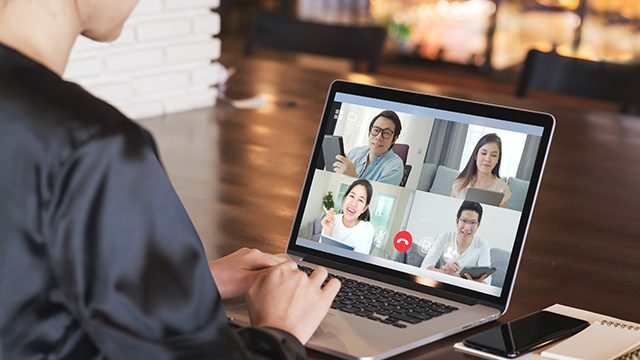SUMMARY
This is AI generated summarization, which may have errors. For context, always refer to the full article.

The rise of video conferencing tools is representative of the digital shift the world faced as the coronavirus spread. It’s become a vital tool in keeping many businesses running even as we work away from the office.
One of the platforms providing such a service is US-based Cisco and their Webex videoconferencing platform. It competes with the likes of Zoom, Microsoft Teams, and Google Meet. But to further have an understanding of the tool, as well as an understanding of this big shift to digital collaboration, we spoke with Cisco’s managing director for the Philippines, Karrie Ilagan.
We have the quick Q&A below, but she also shared with us how much, and how rapidly their own platform grew in the days after the lockdowns. During the lockdown, she said there was one day where Webex handled 4.2 million meetings, which was more than twice the average on a peak day before the pandemic. In March, Webex handled 14 billion meeting minutes, which was more than double the number in pre-lockdown February. Webex, like other work collaboration tools, saw massive spikes.
There’s growth in every region, but in the Philippines, they report seeing a 223% increase in the number of meetings between February and March.
Below, Ilagan, who’s also had stints in Microsoft and IBM, talks more about security features, and how employees and businesses can continue to adjust. Currently, she’s also spearheading the “Konektado” program in Cisco, which aims to strengthen the country’s disaster management capabilities through digital tools. She was also formerly the managing director of Microsoft.
Q: We’re very much past that initial shock of working from home. But moving forward, what can companies and employees do to continue to adjust for the long term or at least until a vaccine is developed?
KI: There is no doubt that the outbreak has impacted economic growth, not just for the Philippines, Southeast Asia or Asia but the entire world.
However, the one thing that this pandemic did bring to the local economy is businesses were forced into adopting technology to ensure business continuity. It accelerated both obsolescence and transformation – our comfort zones that we refused to let go of are now forced to cease to exist, but it also gives us the room to finally build something new.

The outbreak is going to get businesses and sectors to realize that they need to transform the way they have been working – and a large part of that transformation will involve an increased adoption of technology and all things digital. We know that when that happens, companies see tremendous benefits in terms of improved productivity, lower costs, predictive maintenance etc. All of these contribute to higher growth and improved profitability.
That has a knock-on effect on the overall economic growth as well.
So, businesses and employees must first learn to let go of their old habits. Everything they were used to doing no longer applies to this period. It’s high time that businesses embrace technology, and they can do this in small steps. Organize the corporation digitally, then roll out implementation digitally. When nobody is allowed to leave their homes, and we expect this to happen for the rest of the year, the only place for businesses to thrive is online.
Q: Zoom was a star early in this era but privacy issues took them down a peg. How secure, would you say, Cisco and its own work collaboration/video conference tool Webex is?
KI: The mass-scale move to work and learn from home in a relatively short period of time has seen people becoming increasingly dependent on collaboration tools. While we don’t wish to offer any opinion on other companies, at Cisco we believe data privacy is a fundamental human right.
In times like these, bad actors could see this as a greater opportunity to identify those who are most vulnerable. In these uncertain times, we cannot afford to have unsuspecting victims have their personal data stolen or shared – especially when it comes to health and financial data, or that of our children.
As the largest enterprise security company in the world, we are uniquely positioned to protect our customers as their workforces go remote. We have security built into Cisco Webex DNA.
Cisco has invested heavily to build a culture of security with checks and balances in place, which is why Webex is built with security from the ground up. We never make it the customers’ responsibility to opt-out of sharing data or change meeting settings in order to be protected. Some of the things that are integral to Webex to make it secure are:
- Cisco ensures that dedicated room meeting IDs are secured by default to prevent intruders.
- Webex default security settings prevent man-in-the-middle attacks by automatically denying third party proxies unless the proxy can be verified.
- Webex encrypts data being transmitted over room devices.
- Webex transcriptions are done in-house, not by third parties. (Editor’s note: Webex has a video-conference transcription service)
Q: What other key features of Webex make it stand out from the competition?
KI: Webex is a collaboration tool, not merely a video conferencing app. It offers a lot of flexibility in terms of features, depending on what you need. Your tool call can include a whiteboard, desktop and document sharing, applications and even a remote control option. There are also options to connect to a Webex meeting via VoIP or call in from their phone. It can also come with storage space, ranging from 250MB to 1GB, and you can record your conferences for later review.
Ultimately, what really sets Webex apart is security. As mentioned before, you have complex workloads now moving through unsecure home connections. There are so many vulnerabilities that companies are exposed to right now, but Webex will never fail on that end. – Rappler.com
Add a comment
How does this make you feel?
There are no comments yet. Add your comment to start the conversation.